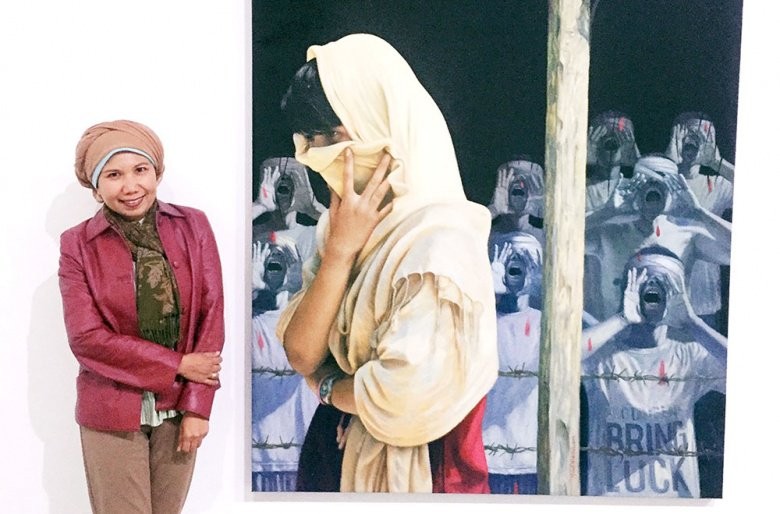Popular Reads
Top Results
Can't find what you're looking for?
View all search resultsPopular Reads
Top Results
Can't find what you're looking for?
View all search resultsLily Yulianti Farid: For the love of writing
A bundle of energy with contagious enthusiasm, Lily Yulianti Farid is best known as the founder of the Makassar International Writers Festival (MIWF).
Change text size
Gift Premium Articles
to Anyone
A
bundle of energy with contagious enthusiasm, Lily Yulianti Farid is best known as the founder of the Makassar International Writers Festival (MIWF).
The accomplished writer with a doctorate in gender studies from the University of Melbourne has created something magical with this annual festival, now in its seventh year, and in doing so she has made a lasting contribution to the life of the nation.
Born in South Sulawesi capital Makassar on July 16, 1971, Lily is the only daughter of a Bugis family. She grew up with the heady scent of the printed word — smells of cut paper and fresh ink.
Her parents ran a modest printing business in the city but it was the weekly visit from “the book warung” (mobile library) that really excited her interest in books and reading. Like a distant lover waits for the postman, the young Lily waited for the man from the mobile library.
Each week he would come at the same time bringing new books on his motorbike — comics and magazines for a family hungry to read. In this way, Lily’s childhood was filled with books.
Her father was an avid reader of popular martial arts writer Kho Ping Ho. The books were rented on a weekly basis. Her mother read women’s magazines. And Lily devoured weekly editions of Bobo, Ananda and Indonesian comics.
By the time she was in primary school, Lily had her own small collection of children’s literature, including translated copies of Enid Blyton’s Famous Fiveand Georges Remi’s Tintin.
With an early instinct for entrepreneurship, she recalls running a small box library, charging her classmates ten rupiah a week for book rentals.
Read also: Agustinus Wibowo: Making peace with identities
In junior-secondary school, Lily began to write, publishing serialized stories in a youth magazine. At 14, she won a writing competition for a short story.
Lily recalls the excitement of receiving a wesel postal note of her prize money which she cashed in at the post office.
“This is fun!” she recalls thinking. “I can get rewarded for writing, the thing I most love to do!” At that point, Lily’s fate was decided. She had become a writer.
She continued to write at senior-secondary school and university, winning several competitions for academic writing and publishing in the campus newspaper. As the medals accumulated in the family cabinet and she attended various ceremonies, the commitment to writing grew.
After graduating from Hasanuddin University with a degree in Agricultural Studies, Lily joined Kompas newspaper as a cub journalist. And, while she still didn’t consider herself to be a “real” writer, she continued to publish fiction.
Life changed again. In 2001, Lily won a scholarship from the Australian Government and went to study in Melbourne, where she completed a Masters in Gender Studies in 2003 and a PhD in 2015. She continued her journalism, writing for Radio Australia and then Radio Tokyo.
Lily first discovered writing festivals in Melbourne. Then, in 2008, she was invited to the Ubud Writers and Readers Festival, and in 2009 she was appointed as a member of the curatorial board for selecting emerging writers from Indonesia at the Festival. In that year, she also took part in the Utan Kayu Literary Biennale at the Salihara in Jakarta and the Singapore Writers Festival.
“I just thought that festivals were such a cool thing!” she says. “The way that writers and readers can all come together; all genres; emerging writers and big names; other artists and audiences. Everyone comes together to discuss literature, writing and ideas. At that time, the picture wasn’t yet clear, but I had begun to think about the idea of a writers’ festival in Makassar.”
In 2008, Lily’s first book, Makkunrai, was published, and, later that year, Maiasaura. Both are collections of short stories that explore issues of gender in Indonesia — and in particular the role of women in traditional Bugis societies.Makkunrai is the Bugis term for “female.” She later produced another short-story collection, entitled Family Room. All three books have been translated into English by the Lontar Foundation.
Read also: Jakarta 1965 and the foreign correspondent
In 2010, Lily and the filmmaker Riri Riza established Rumata’ Artspace in Makassar, and in 2011 she launched MIWF.
All of the experience of writing, of reading, of networking, of journalism and travelling to literary events in Jakarta, Ubud, Melbourne, Singapore, Tokyo, The Hague and elsewhere crystalized into this one event. The magic was born.
When talking about the festival, Lily’s eyes light up.
“There is some magic,” she says, “when people get hold of the idea and begin to make it happen.”
The heart of the festival, she explains, is the people — the volunteers, the sponsors, the audiences, the writers and the artists — all the people that make it happen.
Unlike most literary festivals, all of the events in the four-day festival are free. As a result, the festival attendance is massive. In 2016, over eight thousand officially attended — though the number was probably much higher. This year, in 2017, the number was probably around ten thousand.
“It’s an investment,” explains Lily. “An investment in future generations. I see the young people that came to our first festivals growing up. They now have children, their own families. And their children are readers. That is the future!”
A few days in South Sulawesi to attend the Makassar International Writers Festival soon confirm Lily’s opinion.
The magic is evident when the historic Fort Rotterdam is transformed into a writers’ festival venue. The lights glitter, throngs of people, young and old, gather together for poetry readings, concerts, book launches and discussions — or just to hang out.
The pop-up libraries and temporary books stalls are crowded with readers and the air is abuzz with the excitement of ideas, of literature, of language and words.
With this year’s festival over, Lily settles back to her life between Makassar, where she grew up, and Melbourne, where her husband works and her son is studying at Melbourne University.
She pursues her interest in literature and gender studies — and, while anticipating next year’s festival, she tries to find time to complete the novel she is working on. When asked what the novel about, she simply said, “Ah, you’ll have to wait and see!” with that twinkle in her eye.











